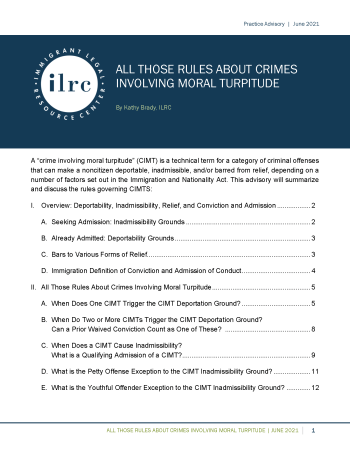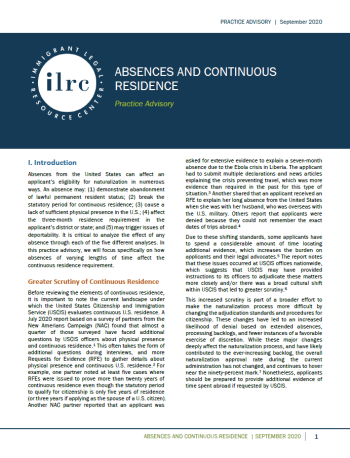This advisory discusses the provisions of SB 54 (De Leon) and the California Values Act, relevant to criminal defense counsel who represent noncitizen clients. In addition to discussing specific provisions of the California Values Act, this advisory discusses how to incorporate this new law into your defense practice.
In the past four years, California voters and the California Legislature have created many new mechanisms for people to reclassify, vacate, and resentence offenses to eliminate the ongoing impact of criminal convictions. This advisory discusses how these new laws can benefit immigrants and can erase or mitigate certain criminal grounds of removability.
This advisory is a follow-up to the ILRC’s free webinar on hardship in waivers from the fall, 2017. Given the volume of questions received during the webinar and overall strong interest in this topic (over 1,000 people registered for this webinar!), this advisory covers the basics and also incorporates frequently asked questions. In this practice advisory you will find an overview of hardship in waivers: when you need to prove hardship, whose hardship counts, and what is hardship. It also covers tips and strategies for analyzing and proving “extreme hardship” in your case by using USCIS guidance, case law, and working closely with your client.
As of January 1, 2018, California has changed its “Deferred Entry of Judgment” program to a true “pretrial diversion” program. See Penal Code § 1000, amended by AB 208. Qualifying defendants charged with minor drug offenses can participate in pretrial diversion without incurring a drug conviction for immigration purposes. This Advisory will discuss how pretrial diversion works, and how to assist immigrants who went through the old Deferred Entry of Judgment.
This practice advisory is designed to introduce practitioners to the concept of Conditional Permanent Residence, and to explain the requirements and processes for removing the conditions on residence, thereby enabling the conditional resident to obtain Lawful Permanent Residence that can last indefinitely.

A conviction of a crime involving moral turpitude (CIMT) may or may not hurt an immigrant, depending on a number of factors set out in the Immigration and Nationality Act: the number of CIMT convictions, the potential and actual sentence, when the person committed or was convicted of the offense, and the person’s immigration situation. A single CIMT conviction might cause no damage, or it might cause a variety of penalties ranging from deportability to ineligibility for relief to mandatory detention.
This practice advisory goes through all of the ways that an arrest or conviction for California driving under the influence (DUI) can affect an immigrant, and reviews possible changes to the law. It also will discuss reckless driving as an alternative to DUI.

Absences from the United States can affect an applicant’s eligibility for naturalization in numerous ways. In this practice advisory, we focus specifically on how absences of varying lengths of time affect the continuous residence requirement.
This practice advisory outlines some suggestions and resources for immigration advocates working with law enforcement agencies to obtain law enforcement certification for U Visa applicants. It also includes a summary of all state laws, as of July 2017, that have either passed or are pending regarding U Visa certification policies and protocols.
This practice alert provides a summary of Flores v. Sessions, a recent Ninth Circuit decision that held that all detained children have the right to a bond hearing. It discusses why Flores v. Sessions was necessary, what its impact may be for detained youth, and details practice tips for advocates representing detained children seeking bond hearings.